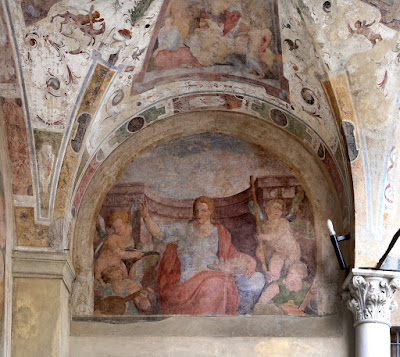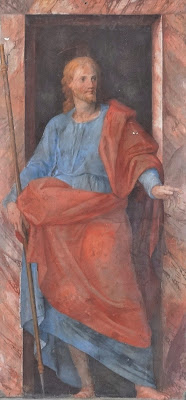 |
| Giovanni Balducci Martyrdom of St Lawrence ca. 1580-90 oil on panel Schorr Collection, London |
 |
| Giovanni Balducci Christ and the Woman taken in Adultery ca. 1581-84 fresco Basilica di Santa Maria Novella, Florence |
 |
| Giovanni Balducci Christ healing the Paralytic at Capernaum ca. 1581-84 fresco Basilica di Santa Maria Novella, Florence |
 |
| Giovanni Balducci Marriage at Cana ca. 1581-84 fresco Basilica di Santa Maria Novella, Florence |
 |
| Giovanni Balducci St James rebuking the Adulterers 1582 fresco Duomo di Pistoia |
 |
| Giovanni Balducci St James with Angels 1582 fresco Duomo di Pistoia |
 |
| Giovanni Balducci Apostle in Faux-Marble Niche ca. 1595 column fresco Basilica di Santa Prassede, Rome |
 |
| Giovanni Balducci Apostle in Faux-Marble Niche ca. 1595 column fresco Basilica di Santa Prassede, Rome |
 |
| Giovanni Balducci Apostle in Faux-Marble Niche ca. 1595 column fresco Basilica di Santa Prassede, Rome |
 |
| Giovanni Balducci Apostle in Faux-Marble Niche ca. 1595 column fresco Basilica di Santa Prassede, Rome |
 |
| Giovanni Balducci Apostle in Faux-Marble Niche ca. 1595 column fresco Basilica di Santa Prassede, Rome |
 |
| Giovanni Balducci Christ in the Garden of Gethsemane ca. 1595 fresco Basilica di Santa Prassede, Rome |
 |
| Giovanni Balducci Road to Calvary - St Veronica ca. 1595 fresco Basilica di Santa Prassede, Rome |
 |
| Giovanni Balducci The Annunciation ca. 1590 oil on panel Chiesa dei Santi Filippo e Jacopo a Scarperia |
 |
| Giovanni Balducci The Annunciation (detail) ca. 1590 oil on panel Chiesa dei Santi Filippo e Jacopo a Scarperia |
"Giovanni Balducci was taught by Giovanni Battista Naldini, the pupil and artistic heir of Pontormo. In his turn, Balducci became the spiritual heir of Naldini. Balducci was active in a number of important commissions in Florence during the 1580s. In 1594, together with Agostino Ciampelli, he transferred to Rome at the invitation of Cardinal Alessandro de' Medici. Shortly thereafter he travelled to Naples in the retinue of Cardinal Gesualdo, where Balducci seems to have settled for the next thirty years, achieving considerable success there with his Tuscan idiom of painting."
– from a biographical notes at Museo del Prado, Madrid